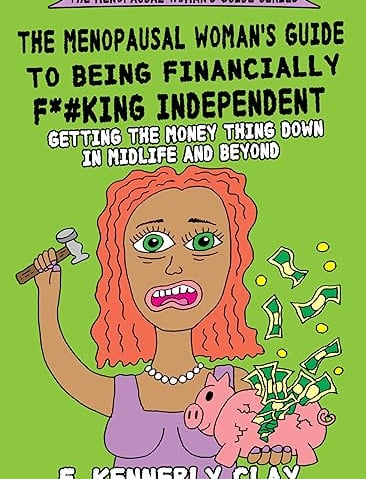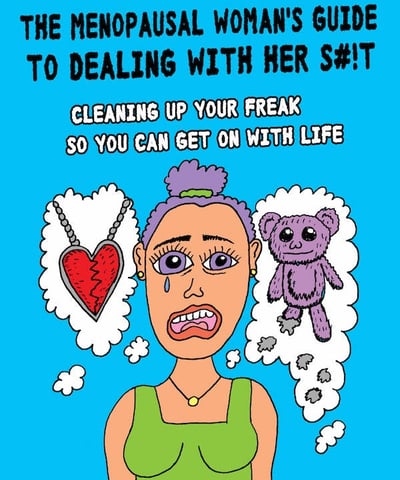Menopause & Why You Want to Leave Your Husband
Many women think about leaving their husbands in menopause. Could be hormones or years of putting up with stuff. Here's how I survived it, staying married.
MENOPAUSAL MENTAL HEALTHMENOPAUSAL SYMPTOMS
Kennerly Clay
7/4/20246 min read


Can menopause make you want to leave your husband?
Menopause often brings a host of challenges, including the need to reassess relationships and personal boundaries. Here’s how I navigated these changes and embraced self-care to reclaim my life, and how these shifts made me question my relationship with my husband.
Menopause and mental health is serious stuff—maybe you can relate? Treating menopause depression is a crucial part of getting through it.
During my time in an intensive outpatient program (IOP)–after a complete menopausal meltdown that left me shaking and raging and feeling like I’d had a psychotic break of some sort–I learned the true meaning of boundaries. This newfound clarity about what I needed to feel safe and respected sometimes clashed with the existing dynamics in my marriage.
I realized that boundaries were being crossed in my household daily, contributing to my stress and frustration. What I learned about boundaries in the IOP was that being in a codependent dynamic was an example of boundary-breaking. Even though our children were adolescents at the time, I could see how I had given up my power early on, back when the stress of having babies and a toddler, along with power struggles and petty arguments with my husband, was overwhelming.
I developed the habit of asking, "What would you like to do?" for nearly everything. This way, he could decide, be happy, and I wouldn't have to face the constant resistance that appeared every time a decision needed to be made. The cumulative effect of me rolling over for more than 15 years and letting him dominate was that I lost my ever-living shit, kicked in my son’s door one night, and ended up on medical leave in a three-month therapy program.
Understanding and implementing boundaries became crucial for my mental well-being. It was also important for me to find time (and space) to be completely alone.
If you or someone you know is in crisis, please call 988, the Suicide & Crisis Lifeline in the United States.
Menopausal mood swings and marriage
Menopause brings significant hormonal changes, which may lead to mood swings, irritability, and emotional outbursts. (Yes to all of the above?) These mood swings can strain even the strongest relationships. If your husband doesn’t understand or is unable to support you during these emotional highs and lows, it can create feelings of isolation and resentment. This emotional turbulence can make you question the stability and supportiveness of your marriage. And this is not just me talking. I've heard it time and again from perimenopausal and postmenopausal women. Shit just hits the fucking fan in menopause and the marriage is often collateral damage.
Of course most of us hardly have a clue as to what’s happening in the moment when it comes to menopause so it can be challenging to even communicate our needs or what we’re experiencing. Looking back on my menopausal journey, I don’t remember being able to articulate much of anything to my husband other than, “Sorry I lost my shit,” and the rage-fueled fury I unleashed on him when I had my mental breakdown.
Sleep disturbances and irritability
Menopause often causes sleep disturbances, including insomnia and night sweats. Chronic sleep deprivation can make small issues seem insurmountable, leading to increased irritability and stress. When you’re constantly exhausted, patience wears thin, and conflicts with your spouse may become more frequent. The cumulative effect of these sleep issues can make you wonder if your marriage is contributing to your stress rather than alleviating it.
Embracing self-care
Self-care became a non-negotiable part of my routine. I learned to prioritize my needs and put myself first. This included everything from taking time for meditation and mindfulness to engaging in activities that brought me joy, like coloring and dancing. As I focused more on my well-being, I began to see how neglecting my needs in favor of maintaining household harmony had taken a toll on me. Shifting your focus to yourself can lead to questioning whether your marriage has really supported your commitment to yourself and maybe even feeling ripped off or robbed in the process. Like, why hasn’t anybody checked in on my welfare?
Loss of libido and intimacy issues
Hormonal changes during menopause can lead to a decrease in libido and physical discomfort during sex. This can create a significant strain on the sexual aspect of a marriage. When intimacy diminishes, couples might feel disconnected, leading women to feel dissatisfied in their relationships. This physical and emotional distance can make you question your commitment to the marriage. Throw in your husband’s own midlife issues, which may include jealousy or anger, and you’ve set the stage for quiet nights in the bedroom.
The role of therapy and support
Therapy played a significant role in my journey. My therapist helped me navigate the complexities of menopause, including the emotional and psychological challenges. Additionally, support from friends and family was invaluable. Sharing my experiences and receiving validation from others going through similar struggles made a world of difference. Through therapy, I realized that seeking help and expressing my needs were vital for my well-being. It also made me question whether our marriage would survive what I was perceiving and going through. There were many times I was convinced it was not going to make it - and I can very well see why women often leave their husbands at this turbulent time in life. We realize everything we’ve been tolerating and the toll it’s taken on our well-being, and we have zero fucks left to give anyone, especially him.
Changes in self-perception and identity
Menopause can alter a woman's self-perception. As physical changes occur, such as weight gain and changes in skin elasticity, women might struggle with body image issues. These changes can affect self-esteem and confidence, impacting how we feel about ourselves and our relationships. We may feel less attractive or valued, which can contribute to thoughts of leaving a marriage that no longer seems fulfilling. If your partner seems to be oblivious to you and your needs, or has essentially been ignoring you for the last decade, it’s easy to start fantasizing about another life without him.
Increased vulnerability to stress and anxiety
The transition into menopause often coincides with other midlife stressors, such as aging parents, career changes, or children leaving home. These additional stressors can amplify the emotional impact of menopause, making us feel overwhelmed. In this state, marital issues can feel insurmountable, leading to thoughts of separation as a way to alleviate stress. Or maybe just a way to change things up and escape what “is.”
Seeking personal fulfillment
Menopause is a time of reflection and reassessment for many women. As we enter this new phase of life, some women might realize they have unmet personal goals or desires. This period of introspection can lead to a desire for change, including reevaluating their marriages. Women may seek more personal fulfillment, independence, or new experiences, which can sometimes mean leaving their current relationships. In order for marriage to survive, we think to ourselves, something’s gotta give.
Communication breakdowns
Effective communication is crucial in any relationship, but menopause can create barriers. If a partner is unaware of or insensitive to the challenges menopause brings, it can lead to misunderstandings and resentment. Women might feel their partners are not listening or supporting them, which can drive a wedge in the relationship and foster thoughts of leaving.
As for me, I was dealing with such crippling depression, I was alone in my experience of life and could not conceivably let my husband in (nor do I remember necessarily wanting to create that connection). It was a brutal number of years in which I felt like I was surviving, just waiting for one of us to die.
Should I stay or should I go? (marriage in menopause)
Reclaiming your life during menopause involves setting boundaries, embracing self-care, and seeking support. While menopause can indeed make you question your marriage, it also provides an opportunity for growth and deeper understanding. It might be painful and it will require boundless patience. There may be anger, rage, and a touch of insanity before all is said and done.
Wanna talk more about marriage in menopause?
Books for women who are losing it in menopause
Mental Health
Losing your mind in peri/menopause?
The menopausal woman's guide series
Financial Health
Had enough of financial insanity?
Personal Growth
Triggers? Old stuff kicking up?
Related topics
Explore helpful articles, tips, and advice for women who are losing their shit in menopause.
Community
Stay Connected
© 2024. Eclectic Content, Inc. All rights reserved.






